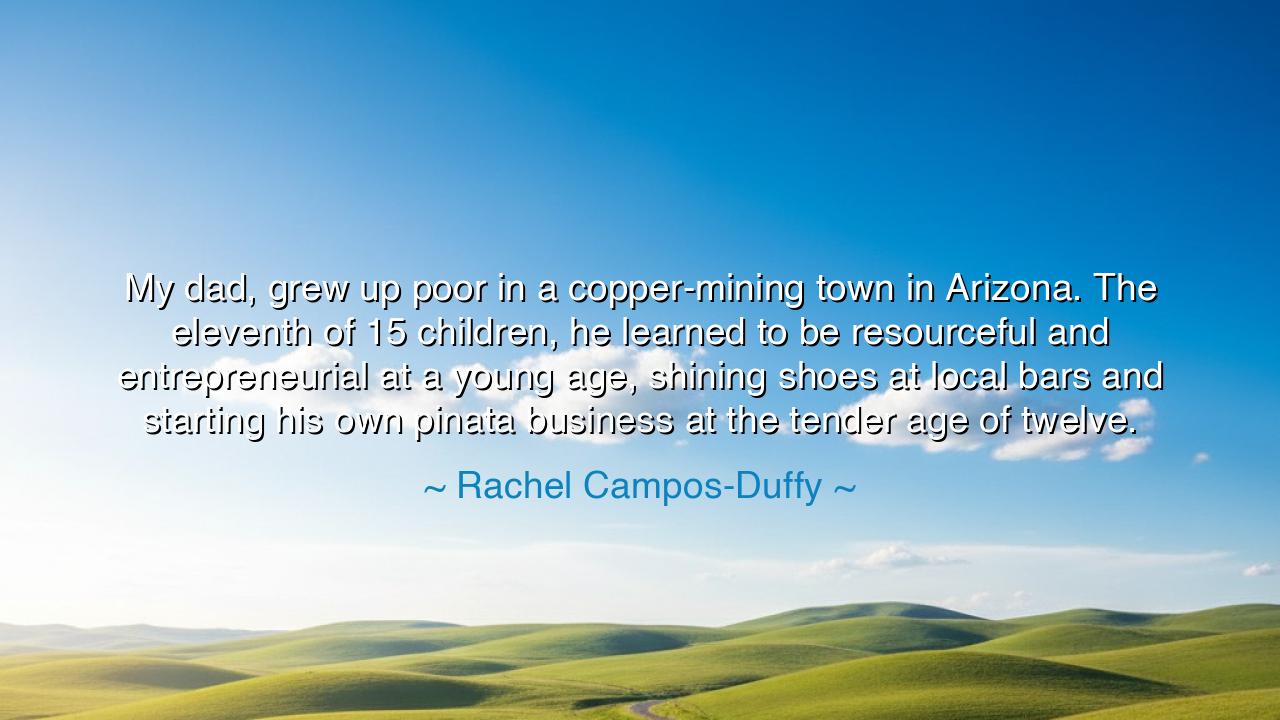
My dad, grew up poor in a copper-mining town in Arizona. The
My dad, grew up poor in a copper-mining town in Arizona. The eleventh of 15 children, he learned to be resourceful and entrepreneurial at a young age, shining shoes at local bars and starting his own pinata business at the tender age of twelve.






“My dad, grew up poor in a copper-mining town in Arizona. The eleventh of 15 children, he learned to be resourceful and entrepreneurial at a young age, shining shoes at local bars and starting his own piñata business at the tender age of twelve.” — Rachel Campos-Duffy
In this heartfelt remembrance, Rachel Campos-Duffy pays homage not only to her father, but to a generation of souls forged in the fires of poverty, perseverance, and purpose. Her words are not mere nostalgia — they are a hymn to resilience, to the sacred dignity of labor, and to the indomitable spirit that rises when life offers little but demands much. In describing her father’s youth — a boy among fifteen, born into scarcity and toil — she reveals the quiet heroism of those who build greatness not through inheritance, but through ingenuity and grit. His story, though humble in detail, resounds like the legends of old: the tale of one who carved his destiny from the raw material of hardship.
When she says, “He learned to be resourceful and entrepreneurial at a young age,” Campos-Duffy speaks of a truth known since the dawn of civilization — that necessity is the mother of invention. The boy who had little was taught by life itself to find opportunity in every corner. In the copper-mining town where wealth was pulled from the earth by sweat and struggle, he did not wait for fortune to find him; he created it with his hands. Shining shoes at local bars was more than a task — it was an education in humanity, a lesson in humility and ambition. And when he began his piñata business at twelve, he showed that creativity and courage can turn even the smallest spark of possibility into a flame of prosperity.
This story, though set in Arizona, is universal. Across time, the great builders of civilization have shared this same spirit. The Roman farmer who tilled the soil by hand, the medieval craftsman who apprenticed in poverty, the American immigrant who came with nothing but dreams — all were bound by the same law of survival and success: to labor, to adapt, to persist. Like the young Campos-Duffy’s father, they did not see their hardship as a curse but as a crucible. And from that crucible came strength — the strength that builds families, raises nations, and inspires generations.
The ancients themselves revered this principle. The philosopher Epictetus, born a slave, taught that wealth is not what a man possesses, but what he can endure. Likewise, Benjamin Franklin, who rose from the pressroom to the pantheon of statesmen, began his life as a boy selling candles in the streets. Such stories are not accidents — they are manifestations of the same divine truth Rachel’s father lived: that poverty, when met with vision and will, becomes the soil of greatness. It is not ease that shapes character, but challenge; not comfort, but necessity.
There is something profoundly heroic in the image of that boy — the eleventh of fifteen — standing in the Arizona dust, his hands stained with work, his mind alight with ideas. He is not merely earning coins; he is forging identity. He learns that value is created, not granted; that dreams demand discipline; that even amid struggle, joy can be found in creation. The piñatas he crafted — symbols of celebration — were themselves metaphors for life: colorful, fragile, yet filled with reward when struck with effort and persistence. Through these early labors, he learned not only how to survive, but how to transform effort into dignity.
And from such beginnings came a legacy. For Rachel Campos-Duffy’s father was not merely a worker; he became a father, a teacher, and an example. His children inherited not wealth of coin, but wealth of spirit — the knowledge that resourcefulness and perseverance are greater inheritances than gold. It is through such people that the spirit of a nation endures: those who rise from scarcity and teach their children not to envy ease, but to emulate endurance. Their triumphs, though quiet, are the foundation stones upon which the towers of civilization are built.
So, O listener, take this lesson to heart: honor your struggle, and see in it not limitation, but opportunity. When life withholds comfort, let it awaken your creativity; when doors close, let it sharpen your resolve. Be like the boy in the copper town — humble enough to begin, bold enough to build. Teach your children not to fear work, but to cherish it; not to pity poverty, but to conquer it through wisdom and effort. For greatness does not descend from fortune — it rises from within those who refuse to be broken by circumstance.
And when you look upon your own hardships, remember this: every act of perseverance is an act of creation. The boy who shined shoes and made piñatas at twelve grew into a man whose story inspired his daughter to tell it — and in that telling, his spirit lives on. Such is the legacy of those who endure — they light the way for all who come after, proving that with courage, creativity, and faith, even the poorest soil can yield the richest fruit.






AAdministratorAdministrator
Welcome, honored guests. Please leave a comment, we will respond soon